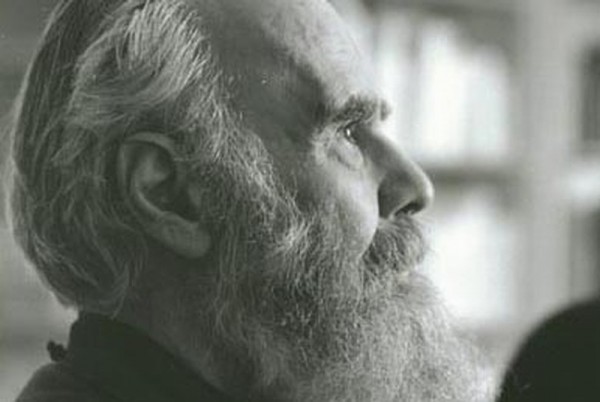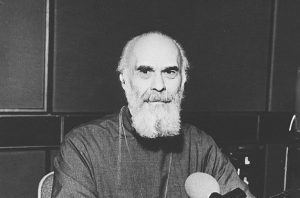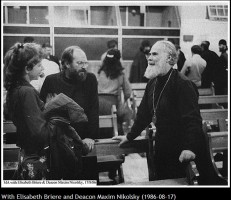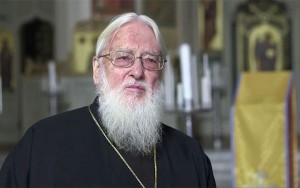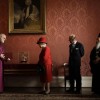Metropolitan Anthony’s life took place in the cruelest century of human history. It was enough to make one embittered, disillusioned, or generally tempted.
So how did it happen that a man who was indifferent to the faith in his youth suddenly became not just a devoutly believing Christian, not just a bishop, but one of the most profound and – I’m not afraid of this secular term – one of the most effective preachers and missionaries of the twentieth century?
Vladyka’s own story about how he, while still an adolescent, sat in a room and tried to read the seemingly alien and incomprehensible Gospel, and felt the invisible presence of God, and how this changed his life forever, is of course impressive. But this experience was his own alone.
And this young noble emigrant, Andrei Bloom, became “one chosen.” We all know that the “Lord works in mysterious ways,” and that “the last shall be first,” that even a tax collector can become an Apostle. But, still, the story of the Metropolitan of Sourozh is somehow special.
He was not a recluse, did not seek after signs, did not speak of miracles, and he didn’t like to speak of unexpected healings. Metropolitan Anthony, a man of high education, was as much of a stranger to formal scholasticism as he was to any kind of exaltation. He did not suppress his intellect, but he did not play in “folksiness.”
Vladyka, as has now become clear from the memories of his contemporaries, was very well oriented in terms of ecclesial diplomacy and hard politics. But, for him, a high rank was never a goal in itself. It, rather, in certain circumstances, helped him technically in the main cause of the Sourozh Vladyka’s life: preaching Christ.
Metropolitan Anthony spent his whole life in the rational, secularized West. All the while, he was a mystic in the most profound sense of this word. Perhaps that very same adolescent experience forever convinced him that that the primary miracle is the real presence of God among us. He devoted his entire life to sharing this feeling with us. Laugh if you want at my naïveté, but when I would come to London and attend services or attend Vladyka’s famous spiritual conversations on Thursdays, I would look around and always thing: “It’s true: the Lord is with us.”
I remember how once at one of these conversations, someone asked him a popular question: what to do if one perceives the morning and evening rules not as prayer, but as custom and (it is implied) a pretty boring recitation. “Remember prayer or passages from the Gospel that especially move you, and read them instead of the rules. The Lord will hear you. He always hears you.”
In 2000 I brought back some aromatic incense from a trip to Athos for the church in Kensington. Vladyka, with his tact and education, was able to express thanks for this detail without making it look like a kind of formality or hypocrisy. What was important for him, as it became clear to me, wasn’t that this was some kind of special incense that had come “from Athos itself,” but more generally that I’d thought of bringing it.
Metropolitan Anthony’s Christian mysticism has another unusual feature. It was, for lack of a better phrase, the mysticism of a sound, sober, and clear mind. Vladyka was so far from conspiracy theories that it caused some suspicion among many newcomers to London, compatriots lacking reason about the “dark forces of anti-Orthodoxy,” masons, and “world government.”
The “Jewish question,” so popular among Orthodox laypeople, was also very – to put it mildly – far from him. I could not imagine – even under threat of imprisonment – the late Metropolitan talking about the “ritual murder” of the Imperial family The Sourozh Vladyka had no time for nonsense.
That said, I could well imagine him arguing with some woman, an Orthodox Englishwoman, on the parish council – and losing the argument. And quietly saying: “What can you do, it’s your decision.” I can imagine it, because I have seen it myself – and was taken aback. “A Metropolitan,” an internationally renowned theologian, and he bows before some aunties! The shock has passed, but the lesson in humility has remained.
In contemporary Russia many did not understand him, and many do not understand him to this day. In particular, because, having lived for forty years in the country of “Pomp and Circumstances Marches” by Edward Elgar, he was a stranger to triumphalism and ceremonies, so often inherent in the upper hierarchy of the most diverse churches.
Was this the consequence of living for so many years in a Protestant county, as many believe? It’s possible, to some extent – although I’m certain this wasn’t the deciding factor. For Vladyka Anthony this simply wasn’t the main thing. That said, undoubtedly his “western” feature was his believe in human reason. And those who came to Christ under the influence of communication with the Metropolitan instinctively felt this.
If one were to seek out a figure for comparison today, then the deep philosophical attitude is close to Pope Benedict XVI, while the style of behavior is like that of Pope Francis. Incidentally, I wonder if Vladyka Anthony and Cardinal Joseph Ratzinger ever met at theological conferences?
Metropolitan Anthony of Sourozh was above all a preacher, and not an administrator. After his retirement, the Sourozh Diocese had few chances to survive as an island of self-government and non-conformist spirit.
We’re left with his books and the audio- and video recordings of his talks. We’re left with the memory of a man and a priest who effortlessly convinced me and thousands of other people that the Lord always listens to us.
Translated from the Russian.












